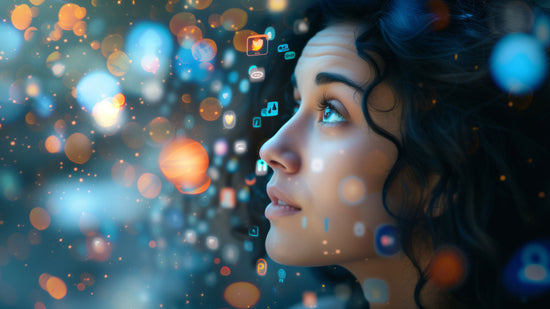The spread of artificial intelligence is a complex and multifaceted phenomenon, and people have different opinions on its nature and implications. Before deciding if you are proudly cheering on “Team AI” or if you still have your reservations about this cultural shift, there are compelling arguments to be considered in both camps, so let’s try to unpack this dichotomy.
Some people view the spread of AI as the natural evolution of technological progress with the potential for numerous positive outcomes. They believe AI can make our lives better, boosting productivity, and revolutionizing industries. Like having a smart assistant that helps solve complex problems and brings new ideas to the table.
Another important positive consequence to consider is that AI represents advancements in technology that have the potential to bring significant benefits to society, such as enhanced productivity, improved efficiency, and the revolution of various industries, leading to positive economic and social transformations. In modern medicine, for example, AI technologies are already assisting surgeons in various ways, from pre-operative planning to real-time guidance during procedures. Surgical robots equipped with AI algorithms can perform precise and minimally invasive surgeries, reducing the risk of complications and improving patient recovery. AI can also analyze real-time data during surgeries, such as imaging scans and vital signs, to provide surgeons with valuable insights and support decision-making.
On the other hand, we can’t simply disregard the moral and social impact of this proliferation. The rapid spread of AI raises ethical concerns regarding privacy, bias, discrimination, and the potential misuse of technology, and careful consideration of its societal impact, regulation, and the preservation of human values in the face of technological advancements are needed.
The lack of regulation is, some may say, one of the most important reasons for concern. Recently, OpenAI CEO Sam Altman, whose company created the ChatGPT and DALL-E text and image generation tools, was one of three artificial intelligence experts who testified on the oversight of swiftly developing technology at a Senate Judiciary subcommittee hearing. “We think that regulatory interventions by government will be critical to mitigate the risks of increasingly powerful models.” he said, in his three-hour-long appearance, signaling both the consensus in the recognition of lack of regulation, and the desire for it. Across the Atlantic, the EU’s effort to enact the world’s first major artificial intelligence regulation took a major step forward on June 14, with the European Parliament approving its version of the AI Act. A final law could be ready before the end of the year.
Developers and supporters of artificial intelligence defend that AI enables novel approaches to solving complex problems and can augment human capabilities. It can help in fields such as healthcare, climate modeling, scientific research, and personalized education, driving innovation and advancements that can benefit humanity. They also claim that AI has the potential to automate routine and mundane tasks, freeing up human time and effort for more creative and value-added activities. It can lead to increased convenience and improved quality of life for individuals.
However, the automation potential of AI technologies can also lead to job displacement and changes in the labor market. Concerns arise regarding the impact on employment, income inequality, and the need for individuals to adapt to new skill requirements. In light of these concerns, it is important to highlight the driving force behind the evolution of society has always been the very need for evolution - mankind has adapted as technology advances, and though there have been dark moments in history that demonstrate otherwise, progress overall has been beneficial for the human race, so viewing the advancement of AI as a partnership with humankind instead of a hostile takeover might be the key.
Shifting the focus from mundane, repetitive tasks easily performed by AI to activities with a deeper level of societal influence, this partnership approach sheds light on the concern that AI systems are only as unbiased as the data they are trained on. If training data reflects societal biases, AI systems can inadvertently perpetuate and amplify those biases, leading to discriminatory outcomes and exacerbating existing inequalities. The increasing reliance on AI systems raises questions about human autonomy, decision-making, and the potential loss of control over critical aspects of life. It is important to ensure that humans remain in control of AI systems and that decisions align with human values. One example of that are the studies that found that AI could dish out harsher prison sentences and bail requirements if unleashed to make judgments.
Another disturbing aspect of the spread of artificial intelligence is the facilitated access to the dissemination of false news. AI technologies can be harnessed to create and spread misinformation at an unprecedented scale and speed. By leveraging AI algorithms, malicious actors can generate convincing fake news stories, manipulate images and videos, and create realistic social media bots that amplify false narratives. Recently, several verified Twitter accounts shared news of an explosion at the Pentagon, which turned out to be an AI-generated hoax. This is just one example of something that poses a significant threat to public trust, democratic processes, and societal cohesion. Not too long ago, a report swirled around the web about a man in China lost 4.3 million Yuan by being scammed into thinking he was helping a friend. He received a video call, and the AI-generated video and audio imitated his friend’s likeness.
AI’s ability to reproduce a person’s likeness is, in itself, a topic of dissension. Earlier this year, a young man used AI to create a lifelike virtual version of his grandmother, who passed away due to COVID-19. While news like this may bring hope to many dealing with grief and loss, or to those who simply wish to see or talk to deceased loved ones once again, there are those concerned with the use of this type of technology for the infringement of an individual’s sovereignty over the use of their own image and likeness. This is particularly true among those in the entertainment industry, and understandably so - the thought of being able to make any celebrity pose, sing or say anything you want without their consent or knowledge is certainly cause for concern. It is crucial to develop robust AI systems that can detect and counter false information, while also promoting media literacy among individuals to empower them to distinguish between reliable sources and misinformation. Responsible development, comprehensive ethical frameworks, ongoing monitoring, and public engagement are essential to address concerns proactively, ensure transparency, and promote the ethical and equitable use of AI to maximize its potential benefits while minimizing potential risks. There’s a balance to be found, just like suggested by this video recently posted by YouTube’s VirtualTech channel.
The fact remains that the spread of artificial intelligence is unavoidable, so what do you think? Is this new era in our society going to end up leading us to the apocalyptical end of the world portrait long painted by Hollywood blockbusters, or is there a path for balance and the greater good?
Whatever your stance is on artificial intelligence, it is important not to loose track of something essential: offline, real-world, real-life connections.

An accomplished translator and writer, Cami has been in the creative field for nearly two decades. Her experience as a linguist in several fields, paired with her background as a native Latina immigrant (born and raised in Brazil and naturalized American citizen) gives her a unique perspective on the social and cultural context of our society. She has been with Techless since 2022 and currently lives in Michigan with her husband of twelve years and their eight-year-old son.






